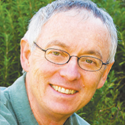
EVERYTHING THAT
HAS A BEGINNING HAS AN END
with Dr Graham Williams
Saying that everything has an end seems so obvious that it’s almost naïve. So you would wonder why anyone would bother saying it at all. However, did you know that one of the Buddha’s disciples achieved what was then called ‘awakening’, and is now called ‘enlightenment’, when he heard this? This seems surprising until you start to ask yourself whether you really believe it. And then it gets a bit difficult to be totally honest. I think that if we’re honest with ourselves we would all admit we hope that there’s something which doesn’t have an end.
I come from the world of classical music where composers hope that their works will be performed for centuries, like the music of Mozart and Beethoven. Peter Sculthorpe, the famous Australian composer, once boasted that a piece of his, written in 1954, was still being regularly performed by children who wouldn’t have a clue who the prime minister at that time was, and it is true.
So we, along with all artists, scientists and politicians, just to name a few, work hard in the hope that something of our lives will be remembered and last. Whether it’s our children or our work, I think you’ll find that the hope is always there. And it’s amazing the effort and work we put into this.
We can often find that accepting the obvious is one of the hardest things to do. We all know we are going to die, but death has now become a medical problem and sterilised rather than a natural part of life, and we have hidden it so much that few people have ever had the experience of seeing a dead body. And the sad thing is that when we sterilise death we also sterilise life.
An instinct for the infinite
However, this statement is somewhat more subtle than just saying everything ends. It says that everything which has a beginning has an end. This implies that if something doesn’t has a beginning it doesn’t have an end.
We seem to have an instinct for seeking something which doesn’t end and there is research suggesting that our brains are hard-wired to seek spiritual experience – to seek something greater than ourselves, something beyond the limits of our minds and bodies, something infinite.
Both mathematics and science have the concept of infinity and this means that our minds can certainly conceive of something endless. It’s very simple to get a feeling for this by thinking of the largest number you can, and then finding that you can always add 1. You can do this indefinitely and, in the same way, you can take away 1 from the smallest number you can think of.
Therefore if something doesn’t have a beginning and an end it couldn’t be a thing, because a thing has a beginning. So it must be no-thing, and therefore mathematics also has the concept of zero, nothing.
The great discovery of the meditation tradition
And that’s what the Buddha discovered. If you look at your mind, when it is still and not thinking, there’s nothing there. This is a discovery everyone who follows a spiritual path can make. However, when nothing is there you also discover that you can’t find a beginning or an end to your mind. And that’s extraordinary.
What’s also extraordinary is that you find your mind is still aware, but not aware of anything in particular. This awareness is just there. It is the foundation of our consciousness, in built in our brains and our senses, and so an integral part of our bodies. It exists without thought because it predates the development of the ability to think.
One way of looking at it is as the potentiality of consciousness – that is, the potential to be conscious is inherent in our bodies, and so is fundamental to our ability to be aware of anything. It is the matrix from which our own individual consciousness and sense of identity develops. Over the millennia it’s been given many names; ‘the ground of being’, ‘the heart of awakening’, ‘the core of our being’ and ‘emptiness’.
It is the great discovery of the meditation tradition and is the true beginning of the spiritual path. Your mind is so still that you are able to see everything clearly, without any of the stories which normally shape what you see: your thoughts, feelings and emotions, and everything in the world around you. In order to see clearly your mind needs to be still, and being able to see clearly is the essence of wisdom.
We can see and feel our mind as vividly alive, clear, radiant and open, and we are capable of experiencing it ourselves, as the foundation of our own minds. We can also clearly see that everything which has a beginning has an end – that death is not separate from life but an integral part of it.
Dr. Graham Williams has over thirty years’ experience teaching both meditation and mindfulness, is the Director of The Lifeflow Meditation Centre and an adjunct lecturer in the School of Medicine at Flinders University. He has written two books, Insight and Love which is in its third edition and Life in Balance. They are both available online. The Lifeflow Centre provides regular meditation courses in their city studio and retreats at their retreat centre in a beautiful, relaxing hills setting. P 8379 9001 W www.lifeflow.com.au